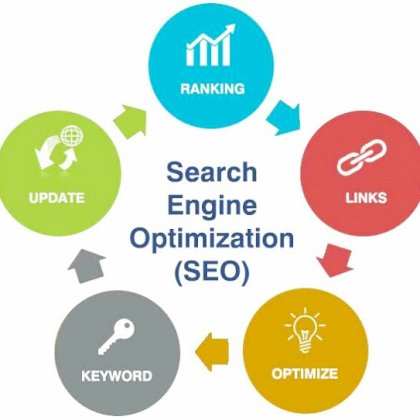Understanding the Cost of Search Engine Optimization (SEO)

cost of google search engine optimization Search engine optimization (SEO) has become an integral part of any business's online marketing strategy. It is the process of optimizing a website to improve its visibility and ranking on search engine results pages. When it comes to SEO, many businesses rely heavily on Google, as it is the most widely used search engine globally. However, optimizing a website for Google's algorithms can come at a cost. There are numerous expenses involved in implementing an effective SEO campaign, including keyword research, content creation, website design, and ongoing maintenance. In this paragraph, we will explore the various costs associated with Google search engine optimization and its significance for businesses.
In today's digital age, having an online presence is essential for businesses to thrive. However, just having a website is not enough. To ensure that your website reaches its full potential, it is crucial to invest in Search Engine Optimization (SEO). But how much does SEO cost? In this comprehensive guide, we will delve into the various factors that influence SEO pricing.
Before we dive into the costs, let's first understand what SEO entails. SEO is the process of optimizing a website to improve its visibility on search engine results pages (SERPs). When done right, SEO can boost organic traffic, increase brand exposure, and ultimately drive more conversions. However, the cost of SEO services can vary significantly depending on several factors.
#1: Competition level:
One of the key factors that affect SEO pricing is the level of competition in your industry. If you operate in a highly competitive niche, where multiple businesses are vying for the same keywords and audience, the cost of SEO will likely be higher. This is because more resources and effort are required to outrank your competitors and secure the top positions on SERPs.
#2: Scope of work:
The scope of work involved in an SEO campaign can also impact pricing. Depending on your specific goals and requirements, the scope of work can vary greatly. For instance, if you only need on-page optimization and content creation, the cost will be lower compared to a comprehensive SEO strategy that includes link building, technical SEO, and ongoing maintenance.
#3: Geographic targeting:
If you operate on a local or global scale, your target audience's geographic location can influence SEO pricing. Targeting a specific city or region requires less effort and resources compared to targeting a national or international audience. Therefore, the cost of SEO will be higher for broader geographic targeting.
#4: Agency expertise:
The level of expertise and experience of the SEO agency you choose can also impact pricing. Established agencies with a proven track record of delivering results may charge higher fees compared to newer or less experienced firms. However, investing in a reputable agency can often yield better long-term results and a higher return on investment.
#5: Timeline and goals:
The timeline and goals of your SEO campaign will also play a role in determining the cost. If you have a specific deadline or urgent objectives, the agency may need to allocate additional resources or work at a faster pace, resulting in higher fees. On the other hand, long-term SEO strategies with a more flexible timeline may offer more cost-effective solutions.
In conclusion, SEO pricing is influenced by various factors, including competition, scope of work, geographic targeting, agency expertise, and campaign goals. When investing in SEO services, it is vital to find a balance between your budget and the level of service you require. By understanding the costs and factors involved, you can make an informed decision and embark on an SEO journey that will propel your business to new heights.
How Much Does Google Search Engine Optimization Cost? Explained in Detail
Google Search Engine Optimization (SEO) is an essential strategy for businesses aiming to increase their online visibility and reach. However, one common question that arises is, "How much does Google SEO cost?" In this article, we will delve into the intricacies of SEO pricing, providing you with a comprehensive breakdown.
Factors Affecting SEO Prices
Several factors influence the cost of Google SEO services. It's vital to understand these factors to make informed decisions and budget appropriately:
- Competition: The level of competition in your industry heavily influences SEO prices. Highly competitive niches require more extensive optimization efforts, resulting in higher costs.
- Website Size: The size and complexity of your website impact the pricing. Larger websites require more time and resources for optimization.
- Target Keywords: The number of target keywords also plays a role. If you aim to rank for numerous keywords, the workload increases, leading to higher costs.
- Geographical Targeting: If you target a specific location, your SEO costs may vary based on the geographic scope of your campaign.
- Previous SEO Efforts: The current state of your website's SEO affects the pricing. If you haven't invested in SEO before, the initial optimization process may take longer and incur higher costs.
Types of SEO Pricing Models
When it comes to SEO pricing, agencies and consultants offer various pricing models. Let's explore the most common ones:
- Monthly Retainer: This pricing model involves a fixed monthly fee for ongoing SEO services. It often includes regular reporting, site audits, and continuous optimization efforts.
- Project-Based Pricing: For specific SEO projects, fixed project-based pricing is used. The cost depends on the scope and complexity of the project.
- Hourly Pricing: Some SEO professionals charge an hourly rate for their services. This model is ideal for small projects or consulting work.
- Performance-Based Pricing: In performance-based pricing, agencies charge based on the results achieved. The cost is determined by the improvement in search rankings or other agreed-upon metrics.
Understanding the Value of SEO
While it's essential to consider the cost of SEO, it's equally important to understand the value it brings to your business. Effective SEO can significantly increase organic traffic, improve brand visibility, and generate leads. By investing in SEO, you invest in the long-term growth and success of your online presence.
In conclusion, the cost of Google SEO can vary depending on various factors such as competition, website size, target keywords, geographical targeting, and previous SEO efforts. Different pricing models, including monthly retainers, project-based pricing, hourly rates, and performance-based pricing, are commonly used in the industry.
Remember, choosing the right SEO partner is crucial for achieving desired results. Take your time to research and select an experienced and reputable agency or consultant that aligns with your goals and budget. By investing in professional SEO services, you lay the foundation for increased online visibility and sustainable business growth.
Factors Influencing the Cost of SEO for Google Search Engine Rankings
Search Engine Optimization (SEO) is essential for businesses looking to improve their visibility on Google's search engine rankings. However, it's important to understand the factors that influence the cost of SEO and how they can impact your budget and overall marketing strategy. In this article, we will explore the key components that determine the cost of SEO and provide valuable insights for businesses seeking to improve their online presence.
The Importance of High-Quality Content
One of the most crucial factors that influence SEO cost is the quality of content on your website. Google values websites that offer relevant, informative, and engaging content to users. By creating compelling content that addresses the needs and interests of your target audience, you can improve your search engine rankings and drive organic traffic to your website.
It's important to prioritize the creation of high-quality content that incorporates relevant keywords naturally. Avoid keyword stuffing, as it can have a negative impact on your website's visibility. Instead, aim to provide valuable information that educates and captivates your readers.
The Role of On-Page Optimization
On-page optimization plays a significant role in SEO and can impact the cost of your SEO efforts. On-page optimization involves optimizing your website's structure, content, and HTML tags to improve its visibility in search engine results pages. Factors such as keyword research, meta tags, alt tags, and URL structure all contribute to on-page optimization.
Investing in on-page optimization is essential for improving your website's rankings. Hiring an experienced SEO professional or agency can help ensure that your website is optimized for search engines, increasing its chances of ranking higher and attracting organic traffic.
The Influence of Backlinks
Backlinks are another critical factor that influences the cost of SEO. Backlinks are links from other websites that point to your website. Google considers backlinks as votes of confidence, indicating that your website offers valuable and trustworthy content. The number and quality of backlinks to your website can significantly impact your search engine rankings.
Building a strong backlink profile requires a strategic approach. Focus on acquiring backlinks from authoritative websites within your industry. Guest blogging, creating valuable content that others want to link to, and networking with relevant influencers are effective strategies for obtaining high-quality backlinks.
Technical Optimization and Site Performance
Technical optimization plays a crucial role in improving your website's visibility and user experience. Factors like website speed, mobile-friendliness, and site security can influence your search engine rankings. Google prioritizes websites that offer a seamless user experience and are optimized for different devices.
Regularly monitor and optimize the technical aspects of your website to ensure it meets Google's standards. Work on improving site speed, optimizing images, and making your website responsive across different devices. This will not only improve your SEO but also enhance the overall user experience on your website.
Conclusion
Understanding the factors that influence the cost of SEO is crucial for businesses looking to improve their Google search engine rankings. By focusing on high-quality content, on-page optimization, backlinks, and technical optimization, you can enhance your website's visibility and attract organic traffic. Invest in SEO efforts that prioritize the needs and interests of your target audience, and you will see long-term benefits for your business.
| Factors Influencing the Cost of SEO | Description |
|---|---|
| High-Quality Content | Create relevant and informative content that engages users and incorporates keywords naturally. |
| On-Page Optimization | Optimize website structure, content, and HTML tags to improve search engine visibility. |
| Backlinks | Build a strong backlink profile by obtaining high-quality links from authoritative websites. |
| Technical Optimization | Optimize website speed, mobile-friendliness, and security to enhance user experience and search engine rankings. |
Finding the Right Balance: Budgeting for Effective Google SEO Strategies
When it comes to optimizing your website for search engines, finding the right balance between your budget and the effectiveness of your SEO strategies is crucial. While it's true that investing in SEO can yield long-term benefits and improve your organic search rankings, it's important to approach this process strategically and thoughtfully.
One of the key aspects of budgeting for SEO is understanding the potential return on investment (ROI). While it may be tempting to allocate a significant portion of your budget towards SEO, it's essential to evaluate the achievable results and weigh them against the cost.
Before diving into the budgeting process, it's crucial to conduct thorough keyword research. This step will help you identify the most relevant and valuable keywords for your website. By understanding what your target audience is searching for, you can tailor your SEO efforts towards these keywords and increase your chances of ranking higher in search engine results.
Additionally, it's important to consider the technical aspects of your website. Ensuring that your website is mobile-friendly, has fast loading times, and is secure can significantly impact your SEO performance. Allocating a portion of your budget towards improving these technical elements can lead to substantial SEO improvements.
Another crucial factor to consider is content creation. Producing high-quality and relevant content not only attracts the attention of search engines but also engages your audience. Allocating a portion of your budget towards creating informative blog posts, articles, and guides can help establish your website as an authority in your industry and improve your search engine rankings.
Additionally, investing in link building strategies can boost your website's credibility and improve your SEO rankings. By acquiring backlinks from reputable websites and directories, you can signal to search engines that your website is trustworthy and valuable. Allocating a portion of your budget towards outreach and link acquisition can yield significant improvements in your search engine rankings.
- Thorough keyword research
- Investing in technical improvements
- Creating high-quality and relevant content
- Implementing link building strategies
It's important to note that SEO is an ongoing process, and results may not be instantaneous. It's crucial to monitor the performance of your SEO strategies and make adjustments as needed. Regularly analyzing key metrics such as organic search traffic, bounce rate, and keyword rankings can help you measure the effectiveness of your SEO efforts and make informed decisions about your budget allocation.
In conclusion, finding the right balance between budgeting and the effectiveness of your Google SEO strategies is essential. By conducting thorough keyword research, investing in technical improvements, creating high-quality content, and implementing effective link building strategies, you can maximize the impact of your budget and improve your website's organic search rankings. Remember, SEO is a long-term investment, and with patience and dedication, you can achieve sustainable growth and success.
Tips for Maximizing ROI: Making the Most of Your Investment in Google SEO
Google SEO is an essential strategy for businesses looking to increase their online visibility and attract more organic traffic. However, simply investing in SEO is not enough to achieve desirable results. To truly maximize your return on investment (ROI), you need to implement effective techniques and tactics. In this article, we will explore some valuable tips to help you make the most of your investment in Google SEO.
1. Conduct Thorough Keyword Research
Anchoring your SEO efforts on relevant keywords is crucial to your success. Take the time to conduct thorough keyword research to identify high-value and low-competition keywords that are relevant to your business. Using tools like Google Keyword Planner can provide valuable insights into search volumes and keyword variations.
2. Optimize Your Website Structure
A well-organized website structure plays a significant role in improving your search engine rankings. Ensure that your website is easy to navigate and logically structured. Use appropriate header tags (
,
,
, etc.) to highlight the main sections of your website. This not only enhances your SEO but also improves the user experience.
3. Create Engaging and Valuable Content
Content is king in the digital world, and it plays a crucial role in attracting and retaining visitors. Focus on creating high-quality, informative, and engaging content that addresses the needs and queries of your target audience. Incorporate relevant keywords naturally throughout your content to improve its search engine visibility.
4. Build High-quality Backlinks
Backlinks are an essential factor in Google's search algorithm, as they indicate the credibility and authority of your website. Focus on building high-quality backlinks from reputable websites that are relevant to your industry. Guest posting, influencer outreach, and content promotion can help you acquire valuable backlinks.
5. Monitor and Analyze Your SEO Performance
Regularly monitor and analyze your SEO performance to identify areas for improvement. Use tools like Google Analytics to track your website's organic traffic, keyword rankings, and conversion rates. This data will help you fine-tune your SEO strategy and maximize your ROI.
| Key Metrics to Monitor | How to Monitor |
|---|---|
| Organic Traffic | Review Google Analytics reports |
| Keyword Rankings | Use SEO tracking tools |
| Conversion Rates | Analyze website performance |
Conclusion
Implementing effective SEO strategies is crucial to maximizing your ROI and making the most of your investment in Google SEO. By conducting thorough keyword research, optimizing your website structure, creating valuable content, building high-quality backlinks, and monitoring your SEO performance, you can achieve significant improvements in your organic visibility and online success.
Remember, SEO is a long-term investment, and consistent effort is required to stay ahead of the competition and achieve sustainable results. Stay up to date with the latest SEO best practices and algorithm updates to ensure your website remains optimized and relevant in the eyes of search engines.
For more information about SEO, feel free to explore the following external resources: (Wikipedia - SEO), (Neil Patel - The Definitive Guide to SEO in 2021)
Frequently Asked Questions
The cost of Google Search Engine Optimization (SEO) can vary depending on several factors. These factors include the size and complexity of the website, the competitiveness of the industry, the goals of the SEO campaign, and the expertise of the SEO agency or professional. It is recommended to get quotes from multiple SEO providers and understand the specific services they offer before making a decision.
The services included in the cost of Google SEO can vary depending on the SEO provider. Generally, SEO services may include keyword research, on-page optimization, technical optimization, content creation, link building, and regular reporting. It is important to clarify with the SEO provider what services are included and what are considered as additional charges.
The time it takes to see results from Google SEO can vary depending on various factors such as the competitiveness of the industry and the level of optimization already in place. Generally, it can take several weeks to a few months to start seeing noticeable improvements in search rankings and organic traffic. SEO is an ongoing process, and continuous efforts are required to maintain and improve the results over time.
While it is possible to do Google SEO yourself, it can be a complex and time-consuming task that requires a good understanding of SEO techniques and best practices. Hiring a professional SEO agency or consultant can often yield better results due to their expertise, resources, and experience. Additionally, SEO professionals stay up-to-date with the latest algorithm changes and industry trends, which can be advantageous for achieving better SEO outcomes.
Yes, there are usually ongoing costs after implementing Google SEO. SEO is a continuous process that requires regular monitoring, optimization, and maintenance to ensure the best possible results. Ongoing costs may include monthly fees for SEO services, content creation, link building, and any other necessary updates or adjustments to the website. It is important to discuss and clarify the ongoing costs with the SEO provider before starting the SEO campaign.
No, Google SEO cannot guarantee top rankings on search results. The ranking algorithms used by search engines, including Google, are complex and constantly evolving. While SEO techniques can improve a website's visibility and rankings, there are no guarantees of achieving top positions. It is important to be cautious of any SEO provider that promises guaranteed top rankings, as it may involve unethical practices that can lead to penalties from search engines.
Google SEO can provide various benefits to a website and its online presence. Some potential benefits include increased organic traffic, improved search engine rankings, enhanced brand visibility, higher website credibility, better user experience, and increased conversions or sales. Proper SEO implementation can help a website reach its target audience, generate more leads, and achieve long-term sustainable growth.
While Google SEO can have numerous benefits, there are also some risks and drawbacks to consider. These include the potential for temporary fluctuations in rankings, the possibility of algorithm updates impacting website performance, the need for ongoing optimization and maintenance, the time and resources required for SEO efforts, and the presence of unethical SEO practices that can lead to penalties or negative reputation. It is important to understand and manage these risks effectively to ensure a successful SEO campaign.
The success of Google SEO can be measured through various performance indicators. Some common metrics used to evaluate SEO success include organic traffic growth, improvement in search engine rankings for targeted keywords, increase in conversions or sales, decrease in bounce rate, enhancement in website engagement metrics, and return on investment from SEO efforts. SEO analytics tools and website tracking platforms can provide detailed insights into the performance of SEO campaigns.
Yes, Google SEO can be beneficial for various types of businesses, regardless of their size or industry. SEO helps improve online visibility and reach for businesses, allowing them to connect with their target audience and compete effectively in the digital landscape. Whether it is a small local business or a large multinational corporation, implementing SEO strategies can assist in driving organic traffic, increasing brand exposure, and achieving business goals.
 English
English
 Turkish
Turkish 























